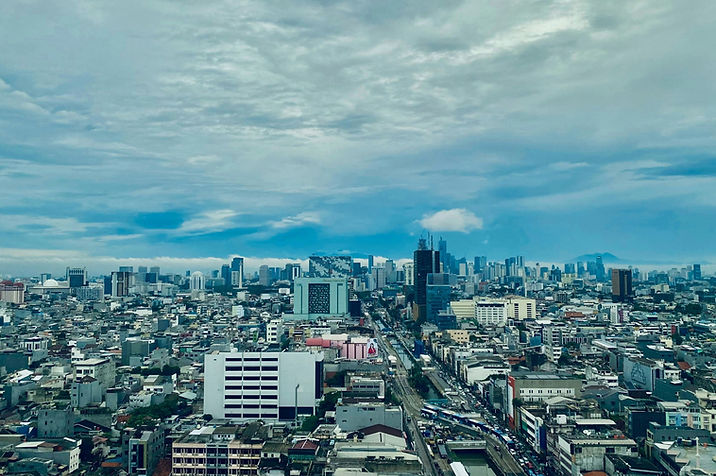
Jakarta, the capital city of Indonesia, is a sprawling metropolis that offers a blend of modernity and tradition. Located on the northwest coast of Java, Jakarta is known for its vibrant nightlife, diverse cuisine, and rich cultural heritage. Visitors can explore the historic Kota Tua district, the National Monument, and the bustling markets of Tanah Abang. With its warm climate, dynamic atmosphere, and friendly locals, Jakarta provides an exciting and enriching travel experience.
A Brief History
Jakarta, the capital of Indonesia, has a rich history that spans several centuries. Originally a small port called Sunda Kelapa, it was an important trading hub for the Sundanese Kingdom. In the 16th century, the port was taken over by the Portuguese, and later by the Dutch, who renamed it Batavia and made it the capital of the Dutch East Indies. The city's strategic location and abundant resources made it a focal point for trade and colonisation.
During the Dutch colonial period, Jakarta developed into a bustling urban centre with a mix of European and Indonesian influences. The city's landmarks, such as the Old Town (Kota Tua), the Jakarta Cathedral, and the Istiqlal Mosque, reflect its historical and cultural heritage. Following Indonesia's independence in 1945, Jakarta became the nation's capital and has since grown into a sprawling metropolis. Today, Jakarta is known for its vibrant culture, diverse cuisine, and dynamic economy. The city's history, combined with its modern development, makes it a captivating destination for travellers.
Jakarta, Indonesia
Attractions and Activities
Jakarta, the bustling capital of Indonesia, is a city known for its rich history, vibrant culture, and modern attractions. Here are some must-visit attractions and activities in Jakarta:
National Monument (Monas): An iconic landmark symbolising Indonesia's independence, featuring an observation deck and a museum.
Ancol Dreamland: A popular recreational complex with amusement parks, a beach, and an aquarium.
Istiqlal Mosque: The largest mosque in Southeast Asia, known for its impressive architecture and cultural significance.
Kota Tua (Old Town): A historic area with Dutch colonial buildings, museums, and cafes, offering a glimpse into Jakarta's past.
Taman Mini Indonesia Indah: A cultural park showcasing the diverse cultures and traditions of Indonesia through pavilions, museums, and performances.
Culture
Jakarta is a cultural hub that reflects the diverse heritage of Indonesia. The city’s cultural scene is vibrant, with numerous festivals, art exhibitions, and music performances. One of the most significant events is the Jakarta International Java Jazz Festival, held annually in March, featuring local and international jazz artists.
Indonesian cuisine is a highlight of Jakarta’s culture, offering a variety of delicious dishes such as nasi goreng (fried rice), sate (grilled skewers), and gado-gado (vegetable salad with peanut sauce). Food markets and local restaurants provide an authentic taste of Indonesian culinary traditions.
Music and dance are integral parts of Jakarta’s culture. Traditional Indonesian music, such as gamelan and angklung, can be experienced at local festivals and events, showcasing the region's vibrant cultural heritage.
Best Time to Visit
The best time to visit Jakarta is during the dry season, from May to September. Here’s a breakdown of the seasons:
Dry Season (May to September): Pleasant weather, ideal for sightseeing and outdoor activities.
Rainy Season (October to April): Higher rainfall, but fewer tourists and lush landscapes.
Jakarta International Java Jazz Festival: Held in March, this festival is a significant cultural event worth planning your visit around.
Suggested Itinerary
Day 1
Morning: Start your day with a visit to the National Monument (Monas) for panoramic views and to explore the museum.
Afternoon: Head to Ancol Dreamland for amusement park rides, a beach outing, and an aquarium visit.
Evening: Enjoy a traditional Indonesian dinner at a local restaurant, tasting dishes like nasi goreng and sate.
Day 2
Morning: Visit Istiqlal Mosque to admire its impressive architecture and learn about its cultural significance.
Afternoon: Explore Kota Tua (Old Town) to see the Dutch colonial buildings, visit museums, and relax in cafes.
Evening: Experience the vibrant nightlife of Jakarta at one of the city’s bars or clubs.
Day 3
Morning: Take a trip to Taman Mini Indonesia Indah to learn about Indonesia's diverse cultures and traditions through pavilions and museums.
Afternoon: Visit local markets to shop for souvenirs, fresh produce, and traditional crafts.
Evening: Attend a traditional music and dance performance to experience Indonesian cultural heritage.

Local Tips
Language: Indonesian (Bahasa Indonesia) is the official language, but English is widely spoken in tourist areas. Learning a few basic phrases in Indonesian can enhance your experience.
Currency: The local currency is the Indonesian Rupiah (IDR). ATMs are widely available.
Dress Code: Dress modestly, especially when visiting religious sites. Light, breathable clothing is recommended due to the tropical climate.
Travel Tips
Emergency Services: In case of an emergency, dial 112 for police, fire, or medical assistance.
Nearest Airport: Soekarno-Hatta International Airport (CGK) is the main airport serving Jakarta.
Transport: Taxis, buses, and ride-sharing apps are common modes of transport. The TransJakarta bus rapid transit system is also an efficient way to get around the city.
Commonly Asked Questions
Q: What is the best time of year to visit Jakarta? A: The best time to visit is during the dry season, from May to September.
Q: What are the must-visit attractions in Jakarta? A: Key attractions include the National Monument (Monas), Istiqlal Mosque, and Taman Mini Indonesia Indah.
Q: Is Jakarta family-friendly? A: Yes, Jakarta offers many family-friendly activities such as visiting amusement parks, exploring museums, and enjoying outdoor parks.
Q: What are the best outdoor activities in Jakarta? A: Exploring historic sites, visiting recreational complexes, and enjoying beach outings are popular outdoor activities.
Q: How can I get around Jakarta? A: Taxis, buses, and the TransJakarta bus system provide convenient transport options. Ride-sharing apps are also available.
Jakarta is a dynamic city that offers a blend of modernity, rich culture, and vibrant activities. Whether you're exploring historical landmarks, indulging in delicious cuisine, or experiencing the lively markets, Jakarta promises a diverse and enriching travel experience. So, pack your bags and set off on an adventure to this captivating Indonesian capital!
Happy travels! 🌍✈️












